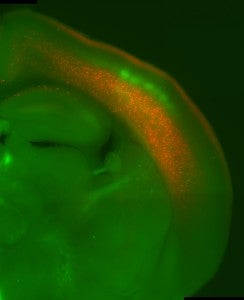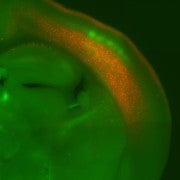Sensory experience is known to shape cortical circuits. Early exposure to detrimental factors, such as stress, can also affect the development of the brain and the penetrance of neurodevelopmental disorders, such as autism orschizophrenia. However, no other type of experience than sensory inputs have been shown to control cortical development in normal conditions. We hypothesize that experience during development is not purely sensory as described with thalamocortical inputs, but is also shaped by other environmental cues or mental states of development.
The goal of the lab is to identify and examine the role of long-range inputs, such as neuromodulatory inputs that project to inhibitory and excitatory neurons in the cortex during development.




